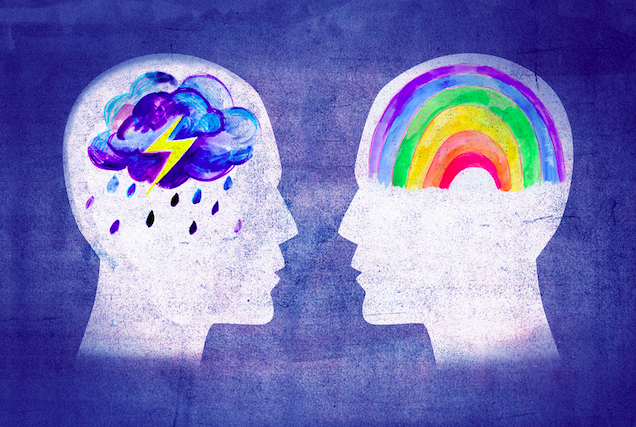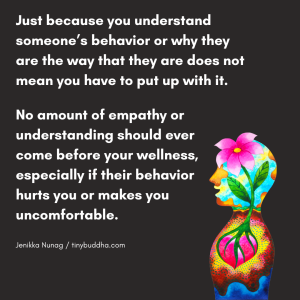
“You have been criticizing yourself for years, and it hasn’t worked. Try approving of yourself and see what happens!” ~Louise Hay
In my quest to learn to love myself I did therapy, read plenty of self-help books, and took personal development courses, hoping I could learn to love myself like I could learn accounting.
This was all helpful; however, when I reached the self-talk stage my progress came to a standstill.
Before then, I hadn’t consciously realized that I used powerfully negative words when speaking to or about myself. I was the first to put myself down, the first to criticize and chastise myself, and my own harshest critic.
While this helped me push through some physical and mental barriers and, therefore, achieve things that I never thought possible—such as completing an Ironman triathlon and running ultramarathons—these moments were the exception, not the rule.
I hid behind the excuse that it motivated me in order to justify being mean to myself, perpetuating the cycle. My so-called valid reasons were holding me back from changing my life and loving myself so that I could be happier and more fulfilled.
I recognized that I spoke so terribly to and about myself because I suffered from incredibly low self-esteem.
I was trying to measure up to my own high, unrealistic standards of who I thought I needed to be in order to be loved, approved, and accepted. But these destructive and critical habits were actually in conflict with what I really needed, as they didn’t allow me to give myself love.
I needed to change the way I spoke about myself, and I needed to do it quickly!
I realized I’d formed these habits as a result of both conscious and unconscious decisions I’d made in the past. And if my thoughts about myself came from decisions I had made in the past, I had the same power today to make different decisions to shape the person that I would be in the future.
These are some of the tricks and tools that I’ve used to overcome my self-esteem issues and begin speaking to myself more kindly:
1. Journaling.
Before I began changing my self-talk, I had used my diary to vent what I was feeling. It was painful to read what I had written. Among the negative thoughts and feelings were momentous and joyous events, but the painful memories and thoughts overshadowed them.
When I purchased a new journal I decided to focus instead on what I did or said for and about myself that demonstrated love and kindness.
So for instance, if I felt fat and was beating myself up about my thighs being too big, I would write that I was grateful that my big thighs were strong enough to help me run marathons.
You too will find that after a few days of consistently doing this you will be able to catch mean thoughts before they spiral into something bigger.
2. Eliminating the words should/must do/have to.
I have stopped using these words and replaced them with kinder words such as “I choose to,” as I found that “should,” “must do,” and “have to” were causing me to feel unnecessary guilt.
As an example, when I set my alarm clock at night instead of saying that “I should wake up early and exercise,” I now say to myself, “I choose to wake up early and exercise.”
Stop ‘shoulding’ all over yourself and you too will feel much better about yourself.
3. Smiling.
In my most recent marathon, instead of beating myself up for not being faster, I started the race with the intention of smiling for as much of as it as I could. It was the best thing that I could have done.
It made me feel good, and the spectators noticed it and cheered me on, which in turn filled me with more positive energy.
Try smiling now and see how much better you feel. Imagine yourself doing this all the time when crossing the road or even when answering the phone. You will find that a little smile becomes a big smile in no time.
4. Saying yes to yourself and no to others.
I have learned to say yes to myself, which sometimes means saying no to others.
I now examine my motives for saying yes to someone else. If it is to be loved and/or accepted, it will likely create disappointment when I don’t get what I expect in return.
Imagine if we all said yes to others only when we really felt it in our hearts. There would be no resentment, and when we do things for others it would be done with joy, creating more positive feelings about ourselves.
5. Accepting that we don’t all have to like each other.
I have started to also worry less about what others think of me and my decisions, so long as I am comfortable with my choices, and they come from a place of integrity and honesty.
This has helped me with my self-talk, as I no longer tell myself that I am a bad person if someone doesn’t like me.
Just as we don’t like everyone else, everyone won’t like us, and that’s okay. You might be surprised how liberating it feels when you are okay with not being liked by everyone else.
6. Asking, “How does this decision make me feel about me?”
I measure every choice against how it makes me feel about myself. I ask myself, “Does this make me feel good about myself? If not, what needs to happen for me to feel good about me?”
For instance, before I accept an invitation to see ‘an old friend,’ I now stop and ask myself, “Would spending time with this person make me feel good about myself?” If the answer is no, then I make a decision to spend my time with someone else whose presence empowers me.
Ask yourself this question and you too will make more choices that build you up instead of tear you down.
7. Setting achievable goals and celebrating progress.
I now set achievable goals and celebrate them. I also don’t beat myself up anymore if I don’t achieve them, or don’t achieve them in the way I had hoped to.
You can celebrate your small accomplishments by going to dinner with friends or buying yourself a small gift as a reward. Whatever it is, make sure that you are present in the moment when you celebrate, as this will reinforce that you are a wonderful person and you deserve credit for all the good you do.
8. Walking away.
I have also learned to walk away from people who don’t treat me with respect. It’s not an easy thing to do; however, if I allow others to be disrespectful toward me, then I perpetuate the cycle and I am also giving myself permission to do the same to me.
You too deserve to be treated with love and kindness—both by yourself and others.
How does your self-talk reflect the way you feel about yourself? Could you be kinder and more loving to yourself?
Two brains image via Shutterstock
About Vanessa Heuser
Vanessa is a Life Coach who helps people connect with what really matters to them based on their values so that they can love the life they live. She blogs regularly at happywithlife.com.au and can be followed on Twitter. In her spare time, Vanessa is either off running somewhere on trails around Melbourne or riding her bike.













 Though I run this site, it is not mine. It's ours. It's not about me. It's about us. Your stories and your wisdom are just as meaningful as mine.
Though I run this site, it is not mine. It's ours. It's not about me. It's about us. Your stories and your wisdom are just as meaningful as mine. 